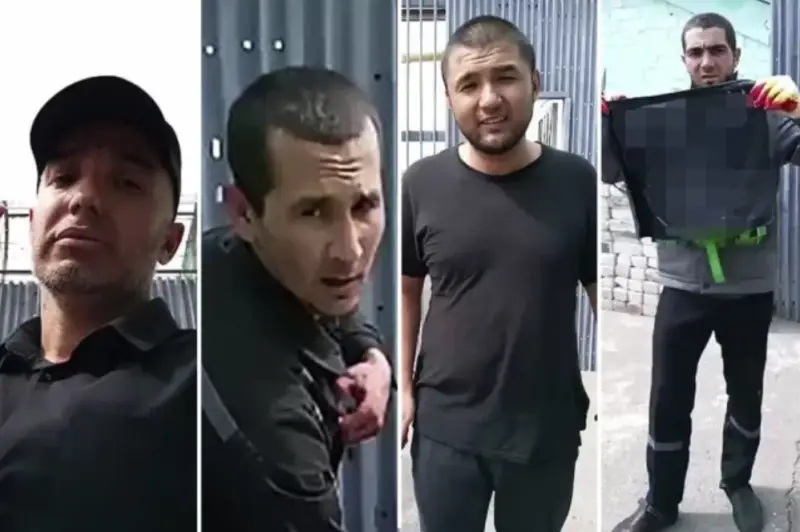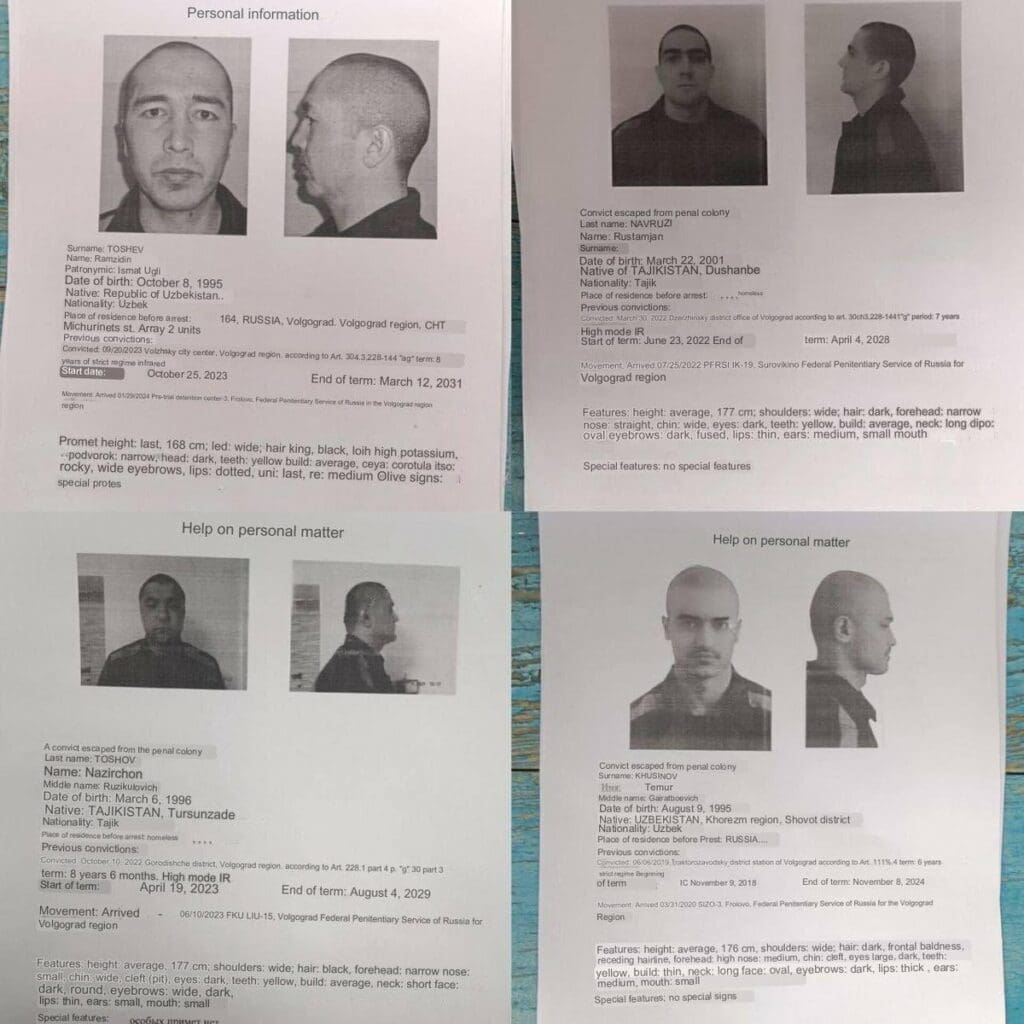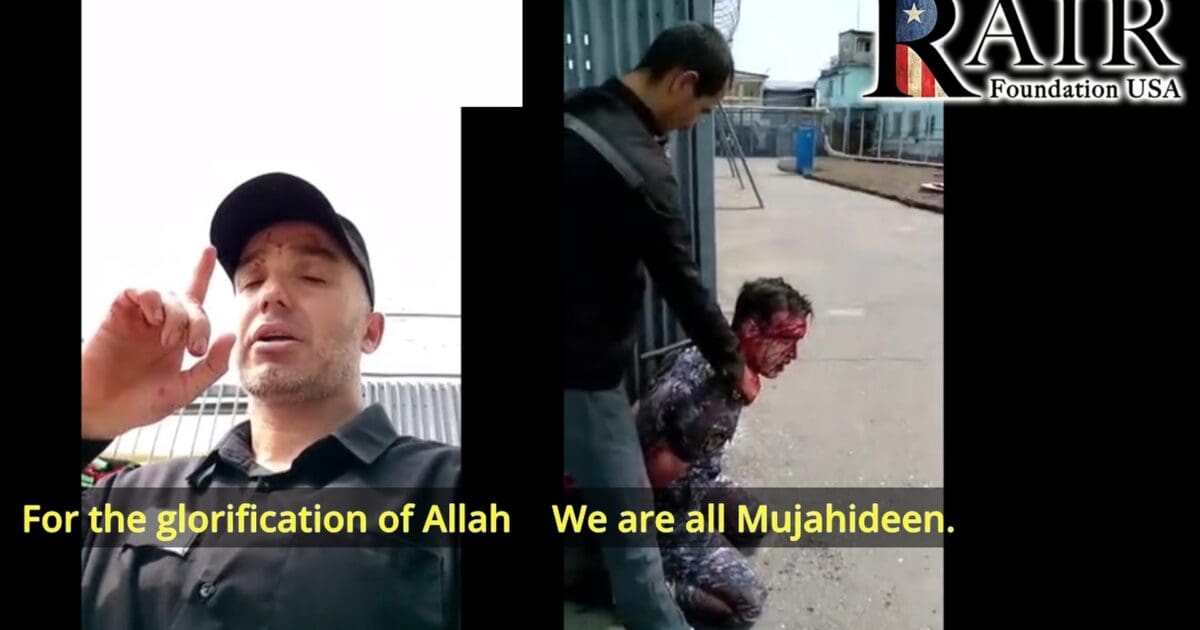In late August 2024, the IK-19 penal colony in the Volgograd region of Russia became the scene of a nightmarish jihad attack that exposed the growing menace of Islamic terrorism within the country’s prison system. A group of Muslim inmates aligned with ISIS orchestrated a horrifying attack that left four prison staff members dead, and the world was once again shocked by the brutality exhibited by Islam. This incident serves as another shocking reminder of the persistent threat posed by Islamic terrorism and the alarming reality that such extremism is thriving and able to inflict so much damage from behind bars.
The Siege Unfolds: A Detailed Account of the IK-19 Attack
On August 23, 2024, four Islamic inmates at the IK-19 penal colony seized control of a section of the prison in a premeditated Islamic attack. The jihadis were identified as Rustamchon Navruzi, Ramzidin Toshev, Nazirchon Toshov, and Temur Khusinov, with at least two of them hailing from Tajikistan and Uzbekistan.

These individuals, who had been “radicalized” (devout religious Muslims) while serving their sentences, were members of ISIS and were motivated by a deep-seated desire to avenge their “Muslim brothers” who had been killed in previous conflicts, particularly those involved in the Crocus City Hall massacre in Moscow earlier that year.

The siege began when the inmates, armed with knives and makeshift explosives, took several prison staff members hostage during a disciplinary session. The attack was marked by brutal violence, with the prisoners slashing the throat of one guard and severely injuring several others. As previously reported, the slitting of the guard’s throat aligns with verses from the Quran that jihadists often cite as justification for their actions. For instance, Quran 8:12 states, “When your Lord inspired to the angels, ‘I am with you, so strengthen those who have believed. I will cast terror into the hearts of those who disbelieved, so strike upon the necks and strike from them every fingertip.’” Similarly, Quran 47:4 instructs, “So when you meet those who disbelieve, strike necks…”.
In a particularly gruesome act, one victim had his stomach cut open, while another was brutally beaten with a hammer and a bottle. The jihadis did not stop at physical violence—they also engaged in psychological terror, forcing their maimed hostages to plead for their lives on video to Putin
The Motivations: Explicit Calls for Islamic Revenge
Throughout the siege, the attackers made their motivations explicitly clear: they were carrying out these acts in the name of Islam, specifically for the sake of Allah and the establishment of Sharia law. In several chilling videos posted online, the attackers referred to themselves as “Mujahideen of the Islamic State” and declared that their actions were acts of revenge for their “Muslim brothers” who had been killed in Syria and during the Crocus City Hall massacre.
One of the key figures in the hostage-taking, Rustamchon Navruzi, who had equipped himself with a suicide vest, was notably vocal about the motivations driving their actions. Alongside his fellow militants, Navruzi issued demands that included a helicopter, £1.5 million in cash, and safe passage out of Russia. They made it clear that failure to meet these demands would result in the execution of their hostages. In a disturbing video, Navruzi was seen holding a knife to the throat of a terrified guard while dictating a message intended for President Vladimir Putin. The hostages, visibly shaken and covered in blood, were coerced into pleading for Putin’s intervention, with one prison officer being forced to say, “I appeal to the President of the Russian Federation, Vladimir Putin, to fulfill the demand. I need a doctor.”
The attackers were explicit in their reasoning, repeatedly stating that their actions were undertaken “for the sake of Allah” and to establish Sharia law. They viewed their violent actions as part of a jihad—a holy struggle—to protect Islam and retaliate against perceived injustices suffered by Muslims globally.
The videos, which were largely omitted from most news reports about the incident at a high-security Russian prison, clearly reveal the motives of the attackers and highlight the dangers of Islamic jihad, particularly in regions where the Muslim population is significant.
Non-Islamic countries are indeed harboring a dangerous threat when they insist on the mass importation of Muslims without requiring them to integrate into Western values.
CAUTION: The videos below are extremely graphic
The Siege’s Dramatic Conclusion: Russian Special Forces Intervene
As the siege dragged on, Russian special forces, known for their ruthlessness, were mobilized to deal with the Islamic attack. The operation to end the siege was swift and brutal. Special forces snipers managed to neutralize all four attackers, including Navruzi, who attempted but failed to detonate his suicide vest. The assault ended with the “liquidation” of all the hostage-takers, bringing a bloody conclusion to the standoff.
In the aftermath, Russian state media reported that at least one prison staff member had been killed, while others were left in critical condition. The head of the IK-19 penal colony, Interior Ministry Colonel Andrei Devyatov, who had been held hostage, was reportedly beaten with a hammer and a bottle but managed to survive the ordeal. Several other prison officers, including Roman Ponomarev and Alexey Lygin, were left with life-threatening injuries, including stab wounds and skull fractures. Reports also emerged that the attackers had bribed prison staff to obtain the knives they used in the assault, highlighting a significant security lapse within the facility.
A Broader Threat: Islamic Extremism Flourishing in Russia
The IK-19 attack is just the latest in a series of Islamic terrorist incidents that have plagued Russia in 2024. Earlier in the year, a similar uprising occurred in a prison in Rostov, where six radicalized inmates took hostages, resulting in a deadly confrontation with special forces. In June, the predominantly Muslim region of Dagestan witnessed a spate of terrorist attacks that left at least 20 people dead. These incidents, coupled with the Crocus City Hall massacre in March, indicate a disturbing rise in Islamic terrorism within Russia.
Despite the escalating threat of Islamic terrorism in Russia, there is growing alarm that President Vladimir Putin’s government is not only failing to combat the spread of Islam but actively facilitating it through policies like the introduction of Sharia-compliant banking. Critics warn that this system, designed to attract investment from Muslim-majority countries, is not just embedding Islam in Russian society—it is directly funding terrorism, providing extremists with the financial infrastructure they need to support and expand their activities.
Additionally, Putin’s stance on Islam has been highlighted by his decision to imprison those who burn the Quran, with the offenders being sent to serve their sentences in Russia’s Muslim-majority regions. This policy has been criticized as effectively sending those who oppose Islamic practices to their deaths, given the potential for violence against them in these areas. This approach has led to accusations that Putin is prioritizing the protection of Islamic symbols over the safety and rights of Russian citizens who oppose Islam.
Further complicating Russia’s position is Putin’s collaboration with Pakistan to combat so-called “Islamophobia,” a term increasingly used as a tool to suppress criticism of Islam and to weaken Western and non-Muslim countries from within. This partnership raises concerns about Russia’s alignment with Islamic nations and the potential implications for non-Muslims within Russia.
Putin’s relationship with the Islamic world is underscored by his statements in Chechnya, where he declared that Russia is the Islamic world’s most reliable partner. Addressing Chechen lawmakers, Putin proudly stated, “Russia has always been the most faithful, reliable, and consistent defender of the interests of the Islamic world,” and went on to emphasize Russia’s role as a steadfast ally to Islamic countries.
These actions and statements have led many to question whether Putin is unintentionally—or perhaps deliberately—fostering the rise of Islam within Russia. As violent incidents like the IK-19 prison siege involving religious Muslims continue to occur, one must wonder if Putin now regrets the growing influence of Islam in his country. Alternatively, could his ongoing support for Islamic practices and Sharia be part of a broader strategy that might have unforeseen consequences for Russia’s future security and stability?

